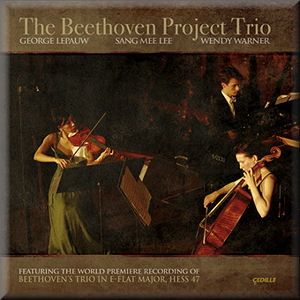 |
 |
|


alternatively
CD:
MDT
AmazonUK
AmazonUS
Sound Samples & Downloads
|
Ludwig van BEETHOVEN (1770-1827)
Piano Trio in E-flat, Hess 47 (arr. Beethoven from first movement
of String Trio, Op.3) (1794, arr. after 1800)* [12:12]
Piano Trio in D, Kinsky/Halm Anhang 3 (1799) (reviewed and edited
by Robert McConnell)* [12:54]
Piano Trio in E-flat, Opus 63 (arr. of String Quintet, Op.4) (1795,
arrangement pub.1806) [34:12]
 The Beethoven Project Trio (George Lepauw (piano), Sang Mee Lee (violin), Wendy Warner (cello))
The Beethoven Project Trio (George Lepauw (piano), Sang Mee Lee (violin), Wendy Warner (cello))
* World premiere recording.
rec. American Academy of Arts and Letters, New York City, 31 August–4 September, 2009. DDD.
 CEDILLE RECORDS CDR 90000 118 [59:57]
CEDILLE RECORDS CDR 90000 118 [59:57] 
|
|
|
The works recorded here have a complex history, which I am summarising:
you will find a more complete account in the very full Cedille
booklet, the contents of which are also available online. You
can read these, hear extracts from the recording, and purchase
downloads in mp3 or lossless flac here.
Classicsonline.com also have this recording as an mp3 download
– here.
The Beethoven Project Trio was formed with the express purpose
of performing and recording all his works in that genre, though
they do also perform music by other composers. The piano employed
is a Fazioli Grand on loan from the Klavierhaus, New York, the
violin a 1713 Stradivarius and the cello a 1772 Gagliano.
None of these works belong in the regular canon of Beethoven
Trios. The E-flat Trio, Hess 47, is Beethoven’s own arrangement
of the opening movement, Allegro con brio, of the String
Trio, Op.3. Though it is an early work, Beethoven’s independence
of Haydn and Mozart is apparent. The Piano Trio version was
published as long ago as 1920, but this is its first recording.
The performance is so apt that I wondered why we had had to
wait so long to hear it.
The Trio in D is preserved in manuscript in the British
Library, in a slightly incomplete form. Robert McConnell has
reconstructed the missing two pages of the first movement, 33
bars in all. The work was formerly attributed to Mozart with
the Köchel Anhalt catalogue number KA52a. It wouldn’t sound
out of place in a Mozart programme, which I intend as praise,
not disparagement. Once again the playing does it full justice.
The most substantial work here, the Op.63 Trio in E-flat,
is a transcription of Beethoven’s Op.4 String Quintet.
Despite some residual doubts that the composer himself made
the transcription, the booklet confidently follows modern scholarship
in accepting Beethoven’s authorship, attested on the title page
of the 1806 Artaria edition, included in facsimile on page 17
of the Cedille booklet. To complicate the history of this work
still further, it began life as a Wind Octet, an early work
(1792), despite the fact that it was published as Op.103. In
its String Quintet version, the work is available on Hyperion
CDA67693, performed by the Nash Ensemble: for further information
about this work’s complicated history, download the Hyperion
booklet from their website here.
Here, too, the playing does the music full justice, so that
one would never suspect that the work had not originally been
composed in this form.
For all that these works have such a complex history, they are
well worth hearing and purchasing by anyone who already has
some of the regular repertoire. Those not acquainted with the
trios should start with No.7, the ‘Archduke’ and No.5, the ‘Ghost’
Trio. A good and inexpensive way to obtain these is on an EMI
Gemini super-budget recording with the Chung Trio which I recommended
as Bargain of the Month (3817512 – see review).
The performances by the Beethoven Project Trio may not be quite
in the same outstanding category as the Chung Trio, but the
undemonstrative playing presents the music in a very good light
and the recording does the performances justice: it has real
presence without being in any way obtrusive. This is Beethoven
in generally affable mood, so neither the performances nor the
recording need to be as up-front as for the late quartets.
Lovers of Beethoven’s chamber music who have already made the
acquaintance of his ‘regular’ Piano Trios should enjoy hearing
this recording of more out of the way repertoire. It should
cater for more than just a niche market: indeed, I understand
that Cedille’s enterprise has already been rewarded – it has
already been selling well in the USA. If in doubt, subscribers
to the Naxos Music Library can try it out there first.
Brian Wilson
|
|












